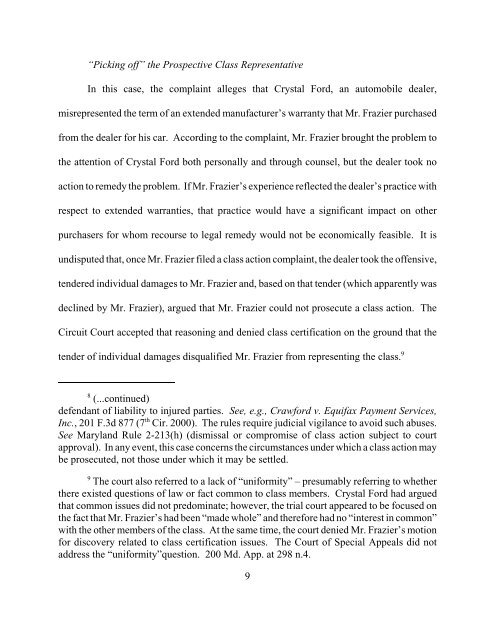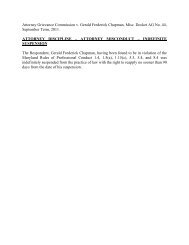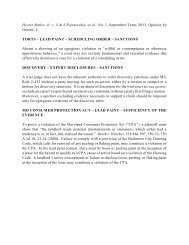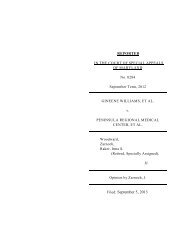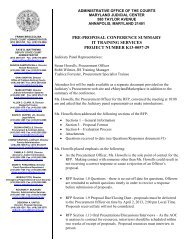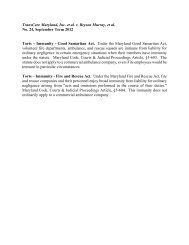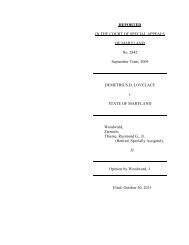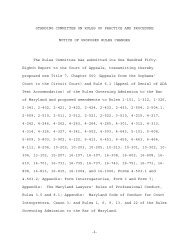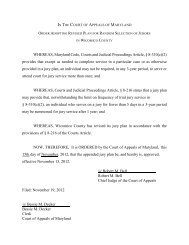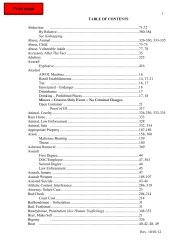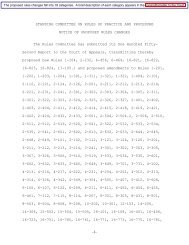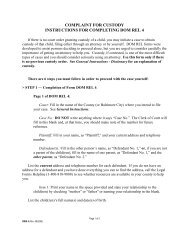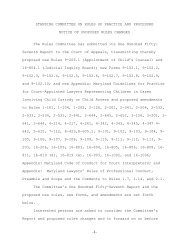Anthony M. Frazier v. Castle Ford, Ltd., f/k/a ... - Maryland Courts
Anthony M. Frazier v. Castle Ford, Ltd., f/k/a ... - Maryland Courts
Anthony M. Frazier v. Castle Ford, Ltd., f/k/a ... - Maryland Courts
Create successful ePaper yourself
Turn your PDF publications into a flip-book with our unique Google optimized e-Paper software.
“Picking off” the Prospective Class Representative<br />
In this case, the complaint alleges that Crystal <strong>Ford</strong>, an automobile dealer,<br />
misrepresented the term of an extended manufacturer’s warranty that Mr. <strong>Frazier</strong> purchased<br />
from the dealer for his car. According to the complaint, Mr. <strong>Frazier</strong> brought the problem to<br />
the attention of Crystal <strong>Ford</strong> both personally and through counsel, but the dealer took no<br />
action to remedy the problem. If Mr. <strong>Frazier</strong>’s experience reflected the dealer’s practice with<br />
respect to extended warranties, that practice would have a significant impact on other<br />
purchasers for whom recourse to legal remedy would not be economically feasible. It is<br />
undisputed that, once Mr. <strong>Frazier</strong> filed a class action complaint, the dealer took the offensive,<br />
tendered individual damages to Mr. <strong>Frazier</strong> and, based on that tender (which apparently was<br />
declined by Mr. <strong>Frazier</strong>), argued that Mr. <strong>Frazier</strong> could not prosecute a class action. The<br />
Circuit Court accepted that reasoning and denied class certification on the ground that the<br />
tender of individual damages disqualified Mr. <strong>Frazier</strong> from representing the class. 9<br />
8 (...continued)<br />
defendant of liability to injured parties. See, e.g., Crawford v. Equifax Payment Services,<br />
Inc., 201 F.3d 877 (7 th Cir. 2000). The rules require judicial vigilance to avoid such abuses.<br />
See <strong>Maryland</strong> Rule 2-213(h) (dismissal or compromise of class action subject to court<br />
approval). In any event, this case concerns the circumstances under which a class action may<br />
be prosecuted, not those under which it may be settled.<br />
9 The court also referred to a lack of “uniformity” – presumably referring to whether<br />
there existed questions of law or fact common to class members. Crystal <strong>Ford</strong> had argued<br />
that common issues did not predominate; however, the trial court appeared to be focused on<br />
the fact that Mr. <strong>Frazier</strong>’s had been “made whole” and therefore had no “interest in common”<br />
with the other members of the class. At the same time, the court denied Mr. <strong>Frazier</strong>’s motion<br />
for discovery related to class certification issues. The Court of Special Appeals did not<br />
address the “uniformity”question. 200 Md. App. at 298 n.4.<br />
9


